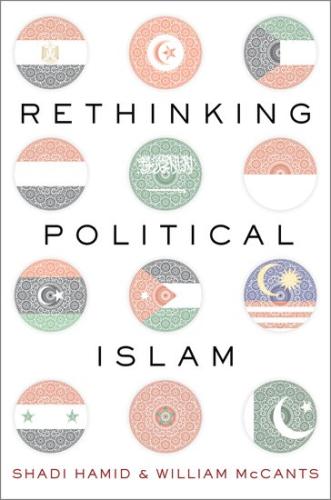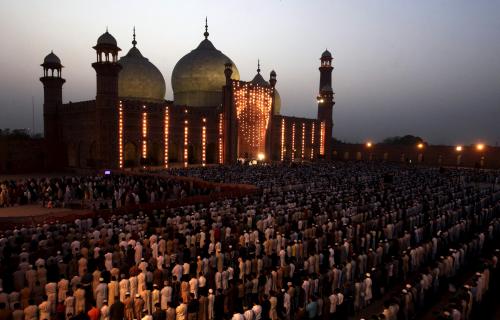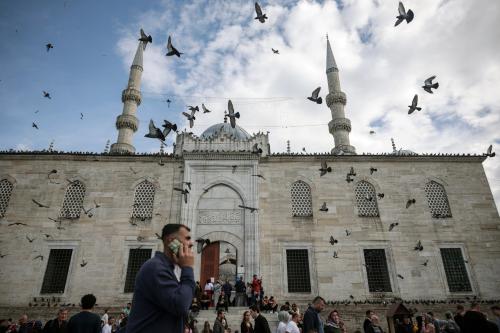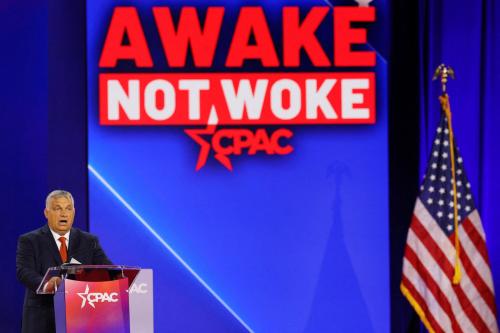The discussion of Islam in world politics recently has tended to focus on how religion is used by a wide range of social movements, political parties, and militant groups. However, less attention has been paid to the question of how governments—particularly those in the Middle East—have incorporated Islam into their broader foreign policy conduct.
On January 8, the Center for Middle East Policy at Brookings hosted the launch of a report titled “Islam as Statecraft: How governments use religion in foreign policy,” authored by two senior fellows, Shadi Hamid and Peter Mandaville. Geneive Abdo—resident scholar at the Arabia Foundation and author of several books on Egypt, Iran, and the broader Middle East—joined Hamid and Mandaville on the panel. Executive editor at the Pulitzer Center and Boston Globe columnist Indira Lakshmanan moderated the discussion.
Saudi Arabia: Have things really changed?
Following introductions by Suzanne Maloney, senior fellow and deputy director of Foreign Policy at Brookings, the event began with a discussion of Saudi Arabia’s export of Wahhabism. Mandaville pointed out that while the Saudi government plays an active role in disseminating its ideology abroad, there are also a number of smaller actors, such as Islamic charities, that have been involved in the same sort of activity.
He went on to discuss how this activity, often perceived negatively in American political circles, was actually something the United States viewed favorably during the Cold War. The more religious a society was, the thinking went, the less likely it would be to turn towards Communism.
Mandaville also pointed out what he saw as a misunderstanding by the American public of Crown Prince Mohamad Bin Salman’s ideology. He noted that “when [MBS] spoke of moderate Islam, audiences in the West heard a narrative about reform and movement away from ultra conservative religion” when in reality, Mandaville believes, it was a way to suppress “interpretations of religion that might actually pose a threat to his consolidation of political control in Saudi Arabia.”
Later on, the conversation returned to Mandaville and Saudi Arabia. Lakshmanan asked him if he sees MBS as a transactionalist who views religion as a way to maintain and build power, and if that is really different than other authoritarian world leaders. Mandaville agreed that MBS is a transcationalist, adding that he believes MBS does not “have any particularly strong ideological commitments with respect to the question of the relationship between religion and politics.”
In relation to MBS’s crackdown on the religious establishment, Mandaville said: “I don’t read that as opposition to religion, I read that as opposition to any force in Saudi society that may threaten his consolidation of power.”
How religion manifests as soft power
Mandaville compared the idea of religion as a form of soft power to ideologies such as liberalism, socialism, and nationalism in that it has the capacity to bolster a nation’s influence on the international stage. He argued that the world should “start paying attention to religion again as in inherently transnational force” and to examine how states are “harnessing religion as part of the broader soft power strategies.”
Building on Mandaville’s point, Hamid added that many Muslim-majority countries are turning towards a foreign policy centered on Islam because it is “really the only effective ideological option.” He added that this is largely because Muslims in Muslim-majority states “find Islam compelling and appealing as an ideological discourse.” When Lakshmanan asked why states are harnessing Islam as a foreign policy tool instead of nationalism, Hamid noted that, in the case of a country like Egypt, “other folks in the Middle East don’t necessarily want to become Egyptian nationalists,” and therefore Islam is much more effective and compelling.
Qatar: What’s next?
Has Islam played a role in the blockade of Qatar? Hamid noted that, while the Qatari ruling family is not necessarily part of the Brotherhood themselves, they “don’t have an objection to supporting it, or they’re broadly sympathetic to it.” The United Arab Emirates and Saudi Arabia, in contrast, see the Muslim Brotherhood’s style of Islamism as “the fundamental threat, and they will do anything in their power to make sure that Brotherhood-style Islamists do not gain ground,” according to Hamid.
From there, Hamid stressed that without “some kind of external stimuli or external pressure that essentially pressures these parties and these countries to resolve these very foundational issues,” the blockade is unlikely to be resolved. Prompted to explain whether that external stimulus included Washington, Hamid said: “Well, there’s not really another option.” The United States needs to exert “leverage and pressure when it comes to things like arms sales and the security umbrella that we provide for Saudi Arabia,” Hamid continued. Only then can there be progress on ending the blockade.
Iran as a player in Islamic statecraft
Abdo then reemphasized the scale of actors in the religious soft power space. She noted that it is not just the Saudis and Wahhabism taking the lead in using Islam as statecraft, but the Iranians, who have been doing so since the 1979 revolution, as well. Iran built schools in Iraq after the 2003 invasion, as well as built institutions, supported political parties, and funded Shiite militias.
She added: “It’s a multi layered type of soft power that has enabled them to really create a stalemate now within the Iraqi government.”
Who does it best?
To end the discussion, Lakshmanan posed the same question to each of the scholars: What country is the most skillful user of Islamist soft power?
Mandaville answered Turkey—citing President Erdoğan’s efforts to rekindle a pride for, what he calls, a “conception of a glorious neo-ottoman Turkish past.” This is especially true in the Caucuses, Southeast Europe, and even East Africa, where, Mandaville notes, Turkey has poured significant funds not just into building infrastructure, but mosques as well.
Unlike Mandaville, Hamid stated he did not think any state was particularly successful. However, he did highlight Saudi Arabia’s ability to curry favor with the West and the United Arab Emirates’ efforts to do the same by promoting interfaith summits between Christians, Jews, and Muslims.
Lakshmanan specified her question for Abdo to Saudi Arabia and Iran, on whose interactions Abdo focuses much of her studies. She responded that, because the countries’ approaches are so different, it is really hard to answer. For the Saudis, she called their strategy “much more domestically oriented” than Iran’s, but that, as the panel discussed, “what happens domestically also has ramifications regionally or becomes foreign policy for these states.” For Iran, Abdo highlighted the regime’s tactic of coopting Shiite societies, building schools and taking on a “big brother” role.
Eli Levine contributed to this post.
The Brookings Institution is committed to quality, independence, and impact.
We are supported by a diverse array of funders. In line with our values and policies, each Brookings publication represents the sole views of its author(s).






Commentary
Islam as statecraft: How governments use religion in foreign policy
February 19, 2019